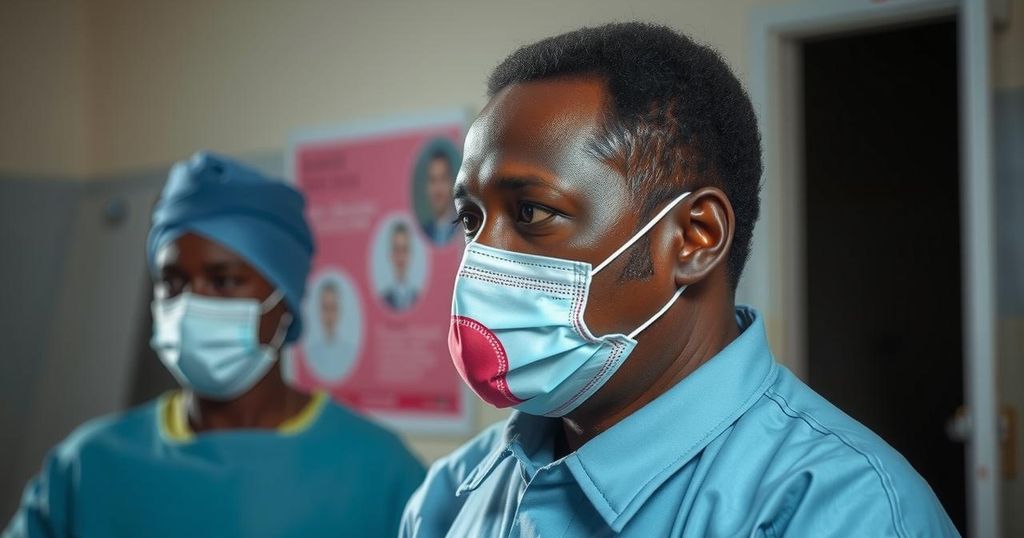Lifestyle
World news
AFRICA, ASSOCIATED PRESS, CONGO (KINSHASA), DEMOCRATIC REPUBLIC OF CONGO, DISEASE OUTBREAK, DR, DRC, DRC MINISTRY FOR HEALTH, EMERGENCY RESPONSE, HEALTH, KI, KIKWIT, KWANGO, MEDICINE, MINISTRY FOR HEALTH, MINISTRY OF HEALTH, NATURAL DISASTERS, NEWSWEEK, PANZI, PUBLIC HEALTH, REUTERS, THE ASSOCIATED PRESS, WHO, WORLD HEALTH ORGANIZATION
Amira Khan
0 Comments
Understanding the Mysterious Disease Outbreak in the Democratic Republic of Congo
A mysterious disease has caused between 30 and 143 deaths in the DRC, primarily in the Kwango province. Symptoms include fever, cough, and anemia, with many cases affecting children. WHO is aiding local health authorities in investigating the situation, while precautionary health screenings have been implemented in response to the outbreak. Experts caution against speculation about the disease’s origins or broader implications.
A mysterious disease has claimed the lives of between 30 and 143 individuals in the Democratic Republic of Congo (DRC) since November 10. The outbreak has predominantly affected Panzi in the Kwango province and has been characterized by symptoms such as fever, headaches, cough, difficulty breathing, and anemia. The World Health Organization (WHO) has indicated that laboratory tests are pending, defining this situation as an undiagnosed illness rather than an unknown one. Preliminary test results are expected shortly from laboratories in Kikwit.
According to varying reports, the WHO has confirmed 394 cases and 30 deaths, while the DRC Ministry of Health stated that there were 79 fatalities, and other sources have cited 143 deaths. Most cases began in mid-October, and alarming statistics reveal that children under the age of 15 constitute 63% of the cases and 81% of the deaths. Health authorities are collaborating with the WHO to strengthen disease surveillance and are deploying international experts to address the crisis.
The WHO team is expected to conduct comprehensive testing for flu, COVID-19, malaria, measles, and other diseases, considering the patients exhibit a combination of flu-like symptoms along with prevalent malnutrition and anemia. The regional challenges, including rural remoteness and ongoing conflict, are complicating the investigation. As news of the outbreak spreads, precautionary measures have been instituted internationally, such as intensified health screenings for flights arriving from Africa.
While some alarm has arisen regarding potential wider implications of this outbreak, experts advise caution against speculation. Dr. Michael Head notes that such outbreaks are typically controlled without significant spread and emphasizes the uncertainty surrounding this case. Dr. Jake Dunning stresses the importance of being patient and supportive of DRC officials and the WHO as they strive to uncover the causes of this concerning illness cluster. Furthermore, he warns that premature labeling of the incident could lead to misinformation and unintended harm.
The emergence of a mysterious disease in the DRC highlights the vulnerabilities of public health systems in regions grappling with conflict, poverty, and malnutrition. The outbreak has predominantly affected vulnerable populations, particularly children, reflecting the systemic issues related to healthcare access in rural communities. The DRC’s ongoing challenges, including political instability and limited healthcare resources, exacerbate the situation, making it difficult to promptly identify and respond to health crises, which calls for an urgent international response and collaboration in disease surveillance and management.
In summary, the unidentified disease in the DRC has raised significant concerns due to the high number of cases and fatalities, largely affecting children. As health officials and international experts mobilize to investigate the outbreak and implement preventive measures, it remains crucial to approach this situation without sensationalism. Continued vigilance, support for local health authorities, and adherence to public health advice are vital in controlling the outbreak and addressing any potential health threats on a global scale.
Original Source: www.newsweek.com




Post Comment